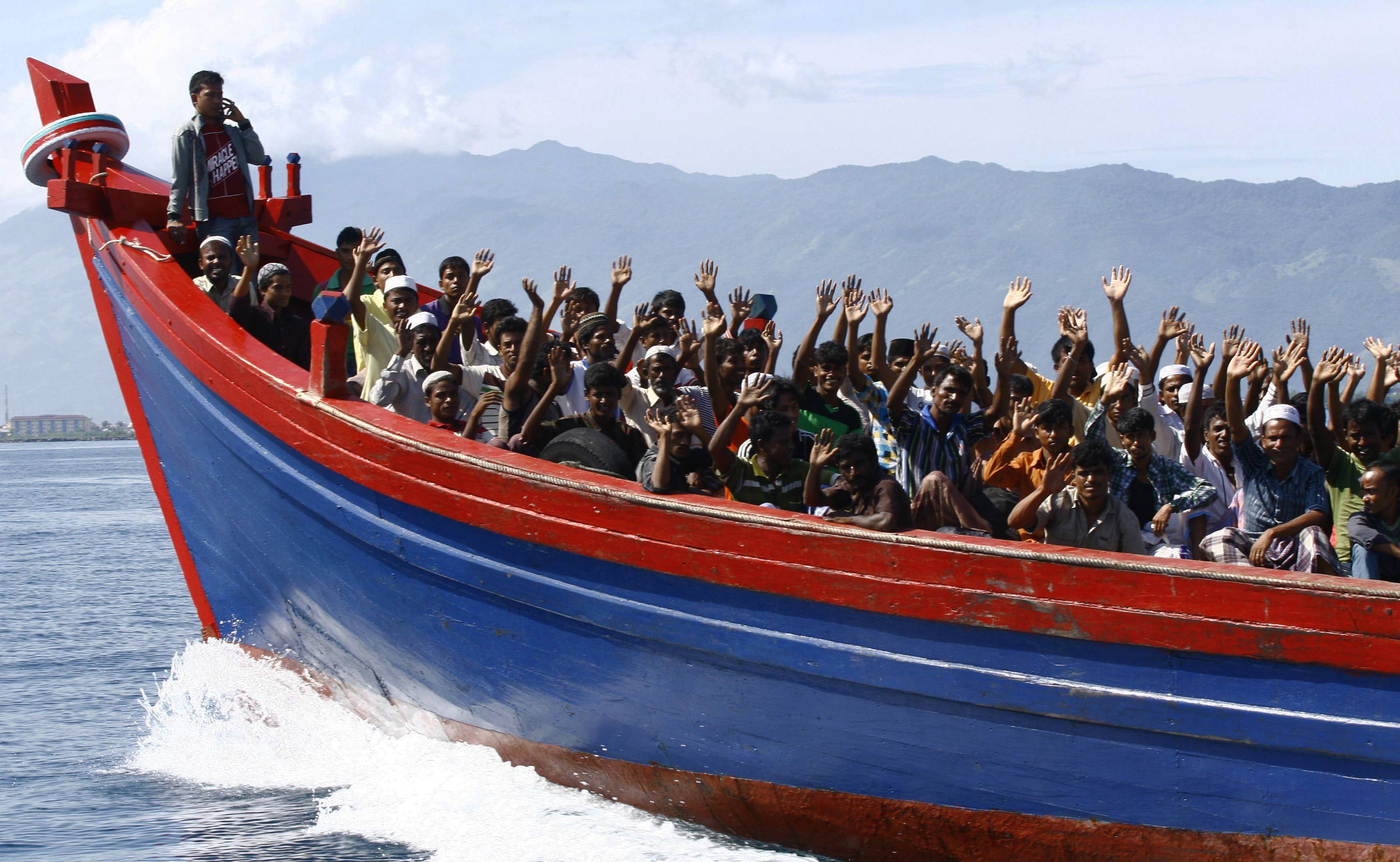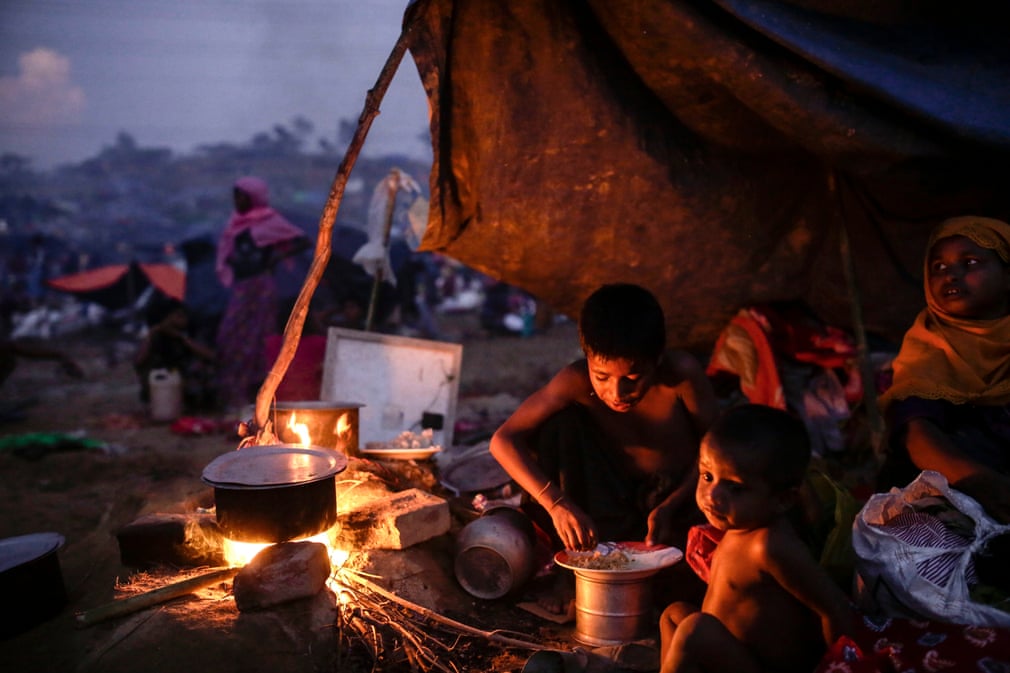
A boat with Rohingya migrants.
When we were born, we were automatically granted Indian citizenship by the principle of jus sanguinis, as is derived from Act 57 of the Constitution of India. The issue of citizenship is so quotidian to us that we hardly think of it. Being an Indian citizen entitles us to a lot of privileges and rights, apart from State duties (that we fail to observe, mostly). But for the time being, let us keep that out of our scope here. Imagine being denied citizenship status by the State where you breathed your first, imagine being shunned by local ethnic communities and sects, imagine being rejected by neighbouring South Asian nations, imagine being homeless in the post-modern twenty-first-century world: and you call yourself a Rohingya.
The Rohingyas are essentially people of Indo-Aryan descent who are denied recognition under the Myanmar Nationality Law. Mostly concentrated in the North Western Province of Rakhine, the Rohingya population has always faced systematic discrimination at the hands of the government and the Burmese people at large, over the decades. However, to fully comprehend the real nature behind their statelessness, a look at the history pages is indispensable.
British Colonialism and Post-Independence Politics
The British began their conquest in Burma as early as 1824, starting with a series of conflicts and wars against the established. As was the practice in India, Colonial interests encouraged migrant labour in order to increase rice cultivation and profits. As part of requirements and policies, many Rohingya entered Burma during this phase of the seventeenth century. Between 1871 and 1911, the Muslim population tripled, as per available statistics from the Census Records. The British also promised the Rohingya separate land – a “Muslim National Area” – in exchange for support. During the Second World War, the Rohingyas supported the British, while the nationalists sided with the Japanese intruders. Customary to tradition, the Rohingyas were rewarded well with prestigious governmental posts. However, the promise of a free state was denied to them.
Right after independence in 1948, the Rohingya population started clamouring for the autonomous province they were promised, but officials rarely showed interest. Branding them foreigners, they were denied citizenship- and thus started the decades-long denial and oppression of the Rohingyas in present-day Myanmar. Other groups and nationalists had only hatred and contempt for the Rohingyas as the latter had enjoyed the patronage of the outgoing colonialists. Such built-up anger only contributed to growing fiery sentiments that were evidently anti-Rohingya. In 1950, some Rohingyas staged a protest against the government, demanding rights of citizenship and recognition, apart from their promised land- the Muslim National Area. The Army took over and in essence crushed all opposition from the Rohingyas- thus, silencing them for the upcoming decades. In 1977, when the Army launched a drive to register citizens, the Rohingyas were deemed as illegal immigrants.
Present Day Crisis and Mass Exodus
The first series of violence against Rohingyas were noted in early 2012. The immediate trigger was the gang rape and killing of a Burmese woman by some Rohingyas, as well as killing of ten Burmese women by the Rakhines. Since then, riots and bloodbath have become common sights, the ground zero being volatile for most of the time. Countless number of pictures have shown how Rohingya villages were burnt and their property being destroyed. At present count, more than 500,000 Rohingyas have fled Myanmarese territory into safe lands- primarily Bangladesh, which has taken in approximately 480,000 refugees until August 2017. This figure shows only the refugee input in the latest series of clashes. Coupled with earlier numbers, Bangladesh is brimming with Rohingya population, struggling to balance its economy and handicapped by humanitarian concerns- it harbours 700,000 plus refugees by a rough estimate.

A Rohingya makeshift camp in Bangladesh. (Credits: The Guardian)
When the present crisis exploded beyond proportions, all major news outlets carried photos reminiscent of the Syrian migrant crisis that plagued the world last year. It is probably imbued in the governmental system to not take notice of and/or apprehend crises in the foreseeable future. It was clear that the Myanmarese Army had intentions poles apart from what the civilised world would expect, yet no one bothered to engage diplomatic measures to take stock of the growing tensions. When the riots finally began, so did the exodus, and it remains a terrible sight till day- people of all ages cramped in a boat, huddling for an uncertain future amidst the roaring waves of fate. For the Rohingyas, the blue sky isn’t blue anymore- it must have assumed a greyish character beyond compare.
Infant #Rohingya refugee sleeping on ground at abandoned school in Kutupalong camp. 500,000 fled ethnic cleansing, massacres in #Myanmar. pic.twitter.com/oWbGWnutA9
— Peter Bouckaert (@bouckap) October 2, 2017
In Bangladesh, Rohingya refugees opened up to International Human Rights watchdog, Human Rights Watch (HRW) that the army had beheaded men, raped their women, carried out armed attacks and facilitated a state of ‘controllable chaos’- if I can put it that way. When the United Nations defined the Rohingyas as the most persecuted ethnic group in the world, they were right- being butchered in their own soil and having an identity crisis in the foreign lands. In May 2017, the Myanmar Army rejected and vehemently denied allegations of human rights abuses in the Rakhine state during a crackdown on Rohingya Muslims. On paper, the crackdown was initiated so as to ensure that Rohingya insurgents who attacked border guard posts were flushed. In practice, and this is my firm conviction, the Army wanted to cleanse the region of the taint of a single Rohingya Muslim.
How India Gets Involved
As already discussed, Bangladesh is beyond the point of recovery: the refugee influx being so heavy that it is an actual threat to the Bangladeshi economy. As such, it is inevitable that the Government of Bangladesh, under Sheikh Hasina, will take steps to send back a significant chunk of refugees. Such a drastic step will meet with ramifications that can, and will, affect the Indian Union. Pushing refugees out of Bangladesh compulsively would only result in the refugees trying to enter India. It is a known fact that at several points, due to geographical and contour inaccessibility, the borders remain open and porous. At present count, India is already hosting forty thousand (40,000) Rohingya refugees. The Central Government has taken a stand to figuratively deny each of the registered Rohingya refugees dwelling in India any further leniency. In an affidavit submitted before the apex court, the Government said that it had sufficient inputs from Intelligence Agencies to ascertain that there were security threats among the Rohingya population in India. Many of such threats were spread across metropolitans.
As a regional power, it is only fair to expect New Delhi to shoulder its quota of responsibility, which it has done in a lot many ways. It has agreed to provide sufficient remuneration and aid to Bangladesh which would then forward it on to the refugee camps. Moreover, it has also upped the ante against Myanmar on diplomatic levels to immediately stop further persecution (although it has had little effect). However, to say that hosting refugees would be the ultimate test of governmental morality is a myth in itself and to be crude, utter rubbish.
On further research, Politics Now has found concrete evidence that the premier Pakistani Intelligence agency, the ISI- is involved in training and recruiting young Rohingyas and subsequently radicalising them with anti-India propaganda apart from the jihadi doctrines. In 2012, two terrorists (Noor-ul-Amin and Ali Ahmed aka Abu Jibral) were arrested in Bangladesh, who confirmed ISI’s support in training and financial assistance to Rohingyas. Furthermore, Indian and Bangladeshi intelligence intercepted three long duration calls between Hafiz Tohar, leader of the Arakan Rohingya Salvation Army (ARSA) and the Inter-Services Agency (ISI)- before ARSA attacked the Myanmar army posts at the border. Currently, twenty percent of the Rohingya population is concentrated in Jammu. Any further shift could escalate dramatic tensions and give rise to sectarian confrontations in the already volatile state. As such, it is understandable that the government wants to take a no-risk policy: a direct deportation would end any chance of a further headache in the future.
The Way Forward
The Rohingya crisis is a perfect example of an ethnic cleansing, a humanitarian crisis that has spiralled beyond all presumptions and has evolved into a mess that cannot be downplayed at any platform. Keeping terse South Asian geopolitics in mind is essential in order to carve out a possible solution, but then again this cannot be implemented without wholehearted acceptance of the masses.
- (a) Protecting and Promoting Freedom of Religion: State restrictions on practising religion can turn to violent extremism after a point. An initiative to promote freedom of religion and free practice of it, therefore, can lead to an equitable situation which has the potential to restore normalcy. This should be a policy priority as the status quo otherwise threatens global security. All the more, enhanced religious freedom would also help to contain or minimize the spread of violent extremism, and in some cases, radical ideology. The President, including high dignitaries like the State Councillor, should take the lead in promoting the concept of religious tolerance and non-discrimination of the Rohingya sect.
- (b) Granting citizenship status to the Rohingyas: A permanent solution to the Rohingya crisis would be to grant citizenship rights to Rohingyas. Decades of injustice can hence be reversed with a single master move. While promotion of free practice of religion would be a most welcome initiative, it is temporal in nature. The Rohingyas should be integrated into the society with full and equal access to basic, fundamental rights that include education, safety, property, and employment, among others.
Thus, if Myanmar can adopt such progressive moves at the earliest, it would only help facilitate a bright future for itself. The Government, along with the Army control, must understand that facilitating a smooth transition to democracy instead of a roller-coaster ride to a state of partial democracy is of utmost importance. Transition to democracy must be smooth, or otherwise armed transitions can destabilize the entire region. And as Desmond Tutu, the famous anti-Apartheid activist recently observed in the context of Myanmar,
“You don’t have to contend with sanctions, you don’t have to spend resources keeping people under lock and key, you can participate in international business and sport, you can attract tourists. And the most important thing … is that this is a moral universe. Right and wrong matter.”
The way forward portion was way too good. You have a good sense of insight. 🙂
Nicely woven …
Well written…but there can always be another perspective from the government’s point of view…as with India and the kashmir issue